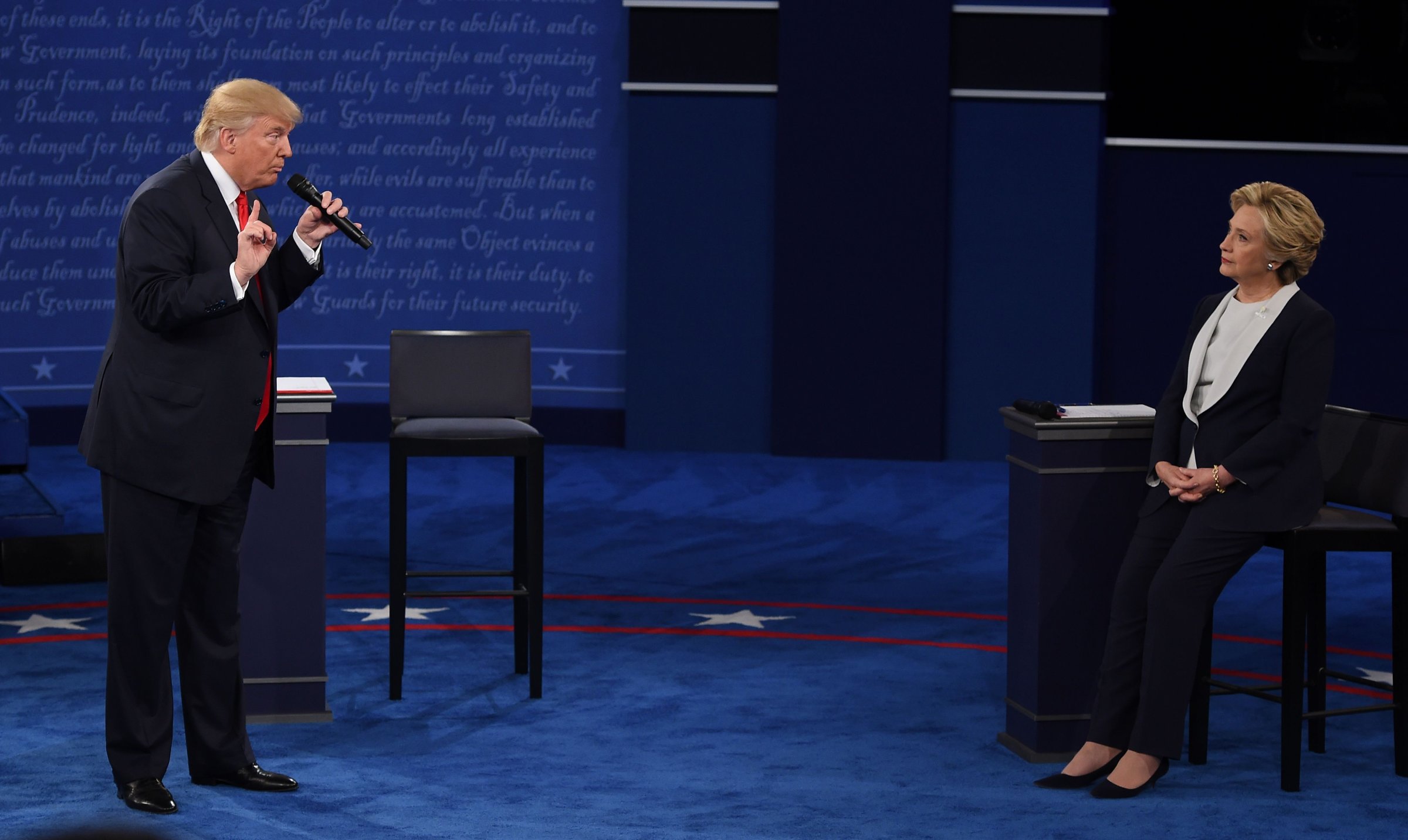
Parry and deflect. Counterattack, insult and wherever possible avoid apologizing. The Donald Trump watched by tens of millions of Americans in Sunday night’s second presidential debate is said to have learned this strategy from Roy Cohn, one of his mentors and lawyers. Cohn tirelessly assisted Joseph McCarthy in the mid-1950s, at the height of the senator’s crusade against Communism. Observers described Cohn as “vicious” and “reprehensible” in his dealings, but also “defiant to the end”—prepared to destroy everything and everyone in his path to achieve victory over an opponent.
In Sunday’s debate, Trump displayed much the same temperament and many of the same bullying tactics. He told the nation that former Secretary of State Hillary Clinton would be imprisoned under his administration and that, despite a lifetime of public service, the former senator “has tremendous hate in her heart.” At one point he called her “the devil” and flatly declared, “You should be put in jail.”
The Republican nominee also learned much from Norman Vincent Peale about the art of lobbing a powerful political grenade. The minister and best-selling author of The Power of Positive Thinking, whose religious services Trump attended for many years, is often invoked as his religious counselor. Peale had a habit of attacking and demonizing his opponents, invariably Democrats, in ways that held them up to public ridicule and scorn.
Trump’s political career dates to his questioning volubly and repeatedly whether President Obama is a U.S. national—accusations that recently stretched to his calling the president the “founder” of a terrorist organization.
Peale’s interventions in major-league politics began with his claims that President Franklin D. Roosevelt was “indifferent to religion,” prone to “dictatorship,” and thus to be spurned for his New Deal. From his pulpit in Manhattan, with press and public riveted by his every move, Peale attacked the polio-afflicted Roosevelt as “a presumptuous seeker after improper power” in light of strife over appointees to the Supreme Court. He assailed the federal government and its social policies as weakening the nation, and warned the voting public: “The man who shows no interest in Christianity and fails to support it is the real enemy of our social institutions.” The contempt that Peale heaped on Roosevelt extended to his saying of a statesman who won an unprecedented four presidential elections, “We can pull him down when we wish.”
As minister of one of the nation’s oldest churches, with a vast media platform and the ear of the country, Peale was exceptionally well placed to make his political opponents seem unbalanced, ungodly, and un-American. Like Trump, he took on the task with relish. Political attacks on Washington flew from his Sunday pulpit, with the message packaged as a promise of national renewal through personal and religious redemption. Also like Trump, Peale saw his press folders crammed with the activities and accusations of a man possessing an extraordinary appetite for political conflict.
In the 1930s, when the religious ministry was seen as inherently nonpartisan and thus politically valuable, Peale’s denigration and demonization of his opponents helped inflame national passions and resentments. The result was a potent redrawing of “us” against “them”—with the latter chiefly made up of immigrants, migrants, the destitute and the nonreligious. A comparable firebrand today, Trump has taken a page from the same rulebook, with equally dismal results. The pattern is to reduce an issue to its most polarizing elements, then denigrate the rejected parts as menacing, absurd, untrustworthy, or—if need be—all three.
Time after time, from his televised mockery of disabled reporter Serge Kovaleski to his disdain for the parents of slain Muslim veteran Army captain Humayun Khan, from his repeated characterization of undocumented immigrants as “criminal aliens” to the insults tossed at Hillary Clinton and numerous other women, Trump has zealously pursued the same polarizing strategy: attack, ridicule and demonize. Divide the world into winners and losers, and pour scorn on the latter. Sow doubt, stir outrage, fabricate conspiracies and cause national havoc if it leads to personal, political or commercial gain.
The guaranteed outcome of such a strategy, Peale could well attest, is greater acrimony and division ahead.
More Must-Reads From TIME
- The 100 Most Influential People of 2024
- Coco Gauff Is Playing for Herself Now
- Scenes From Pro-Palestinian Encampments Across U.S. Universities
- 6 Compliments That Land Every Time
- If You're Dating Right Now , You're Brave: Column
- The AI That Could Heal a Divided Internet
- Fallout Is a Brilliant Model for the Future of Video Game Adaptations
- Want Weekly Recs on What to Watch, Read, and More? Sign Up for Worth Your Time
Contact us at letters@time.com